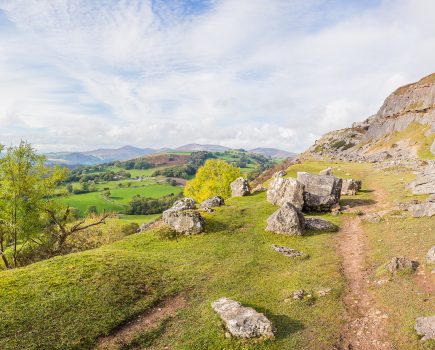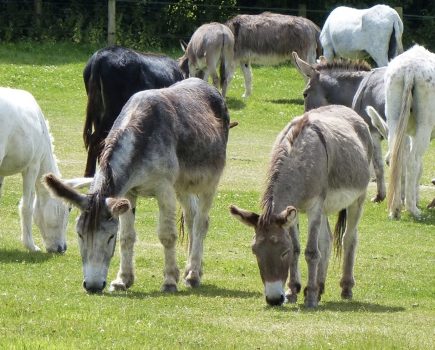Sept 18, 2012: TV presenter Kate Humble and her husband Ludo faced a huge challenge when they decided to buy a council farm near Monmouth. Now they are up and running – and they have teamed up with Country Smallholding writer Liz Shankland to offer a range of ’good life’ courses. Liz talked to Kate about her ‘good life’ adventure …
She may have the image as the sweet girl-next-door with the sunshiny smile, but trust me – you wouldn’t want to get on the wrong side of Kate Humble. “I can’t believe that anyone could be so incompetent!”, she bellows into her iPhone. “And don’t call me ‘Dear’! I’m not 70!” It wasn’t the best time to be meeting my new boss for the first time. I was calling at Kate’s 117-acre farm in Monmouthshire, South Wales, for a meeting to discuss starting up some courses for smallholders. Unfortunately, an order of equipment has been bungled, and now a stroppy courier, who is trying to deliver to Kate’s home a few miles away, rather than to the farm, is getting a good old ear-bashing. But don’t get the wrong idea, because such explosions are very rare. The majority of the time with this woman, what you see on the TV screen is what you get. The presenter who captures hearts wherever she goes is very nice indeed – but also extremely tough and businesslike. And let’s face it, she has to be, given the challenge ahead. As well as having incredibly busy careers in television, she and her producer husband Ludo Graham have taken on a challenge of massive proportions – buying a former council-owned farm, masterminding an extensive renovation of a house and outbuildings, recruiting tenants to run the bulk of the acreage, and, on top of everything, setting up a centre for the teaching of traditional rural skills and animal husbandry. “Some people think we must be crazy – and sometimes, when things go wrong, we think just that ourselves!” Kate says. “The world is in recession, companies are being forced into bankruptcy, and people are being made redundant everywhere. And what are we doing? Setting up a business – and with no experience whatsoever! “On a bad day, when there are problems and delays, or when things are out of our control and tied up in bureaucracy, I feel like standing in a field and yelling, ‘I’m trying to do my best! Won’t somebody help me?’ But then there days of incredible highs which just fill you with an amazing feeling of contentment and you know that all the hard work and hassle is all worthwhile.” HOW IT STARTED The undoubtedly ambitious Humble by Nature project began almost two years ago, when Kate and Ludo heard that tenants of a farm not far from their own four-acre smallholding were retiring. Monmouthshire County Council had decided to auction the farm in a number of small lots – a common route taken by cash-strapped local authorities to generate income. “Council farms are rare commodities these days, and more and more are being sold off,” Kate explained. “They have traditionally been tenanted by young farmers without land of their own. For generations, they have helped people to get a start in farming, whilst also playing an important role in the rural economy. They are being sold off right across the UK, not just here in rural Monmouthshire. We couldn’t bear the thought of another one being carved up into small pieces, the farmhouse being sold off with a patch of land, the barns being sold with planning permission for housing. We had to do something.” So began more than six months of phone calls and emails, in a bid to get a meeting with the council. “Our plan was to try and convince them that there were other ways of generating the revenue they wanted without selling everything off piecemeal. We wanted it to remain a working farm, but we weren’t quite sure how we would do that. “Ludo and I were relative newcomers to smallholding and, although we had a few chickens, some sheep, and two Kunekune pigs, we were under no illusion that we could run an entire farm. Friends suggested getting tenants in and, eventually, we met Tim and Sarah Stephens, who had been on the waiting list for a council tenancy for years. They were to become a major part of our plan – if the council gave us the go-ahead, they would run the bulk of the farm, while the older buildings in the centre and about 17 acres would form part of our teaching centre. We thought it was very important that people coming on our courses didn’t feel they were just coming to some kind of toy farm with just a few pretty animals. We wanted it to be set at the heart of a proper, working farm.” After numerous meetings with the council, business advisors and accountants, Kate and Ludo had to appear before the council’s all-powerful Cabinet for a thorough grilling. They came out triumphant. The council agreed to sell, but insisted on retaining 30% ownership of the farm as a safeguard, so that if the whole venture failed, Kate and Ludo couldn’t just sell to the highest bidder. The couple took over the reins last November and have scarcely drawn breath since. The farmhouse and buildings have undergone major redevelopment to make them more user-friendly, classrooms have been constructed, and the livestock – originally solely cattle and sheep – have been arriving thick and fast. They include two big old sows, Myfanwy, a Berkshire and a British Saddleback called Blackberry, soon to be joined by a Welsh sow and some Tamworth weaners. There’s a group of rowdy, in-your face, bottle-fed lambs, a varied selection of chickens and geese, and a pair extremely affectionate cross-bred goats, Honey and Biscuit. Kate’s pet Kunekunes, Duffy and Delilah, will be relocating to the farm soon, and some new beehives are about to be set up, so there will be plenty on site for smallholders in search of some hands-on experience. Humble by Nature courses started earlier this year with sessions in hedge-laying, foraging, tree identification, and orchard-planting and have proved hugely successful. Thoughout the coming months, there will be courses for those interested in keeping sheep, pigs, poultry, bees, as well as a whole range of ‘foodie’ workshops focusing on subjects such as salting and curing, sausage making, charcuterie, and festive food. True to their aim of keeping everything local, Kate and Ludo’s team of experts are either from the area, or within a few miles’ distance – as is the food which goes into the hearty lunches cooked up for course attendees by chef Katherine Marland. OPEN TO EVERYONE “The courses are open to everyone,” Kate says. “You don’t have to be a landowner; you don’t have any prior knowledge of the subjects involved. You can be a smallholder who wants to learn about keeping a particular type of animal or mastering a rural skill, or you can be someone who lives in a city and just fancies spending the day on the farm and enjoying the experience. What we want is for people to come here, enjoy getting their hands dirty, and go away having had a great time. It may help some make up their minds whether or not smallholding is for them. Some may love it, but others may realise they don’t like it at all – which is very important if you’re contemplating a major change of lifestyle and possibly a move to a completely different part of the country.” There are hopes that Humble by Nature will bring spin-off benefits for all kinds of nearby businesses. The farm is located near the Welsh border town of Monmouth, in the picturesque Wye Valley, so people attending the courses may be tempted to make a weekend of it, stay in local hotels and B&Bs, and visit other attractions in the area. Kate and Ludo make no secret of the fact that their plans initially faced some opposition from certain sectors of the community. “Some people thought that, as we worked in telly, there would be paparazzi hiding in the bushes and that we would be having wild, celebrity parties all the time!” Kate explained. “There were others who wanted to buy some of the farmland for themselves, so they had a vested interest in opposing us. Some people described this as a ‘vanity project’. Well, let me tell you – there are far easier and cheaper ways of being vain!” Fortunately, those early fears have now subsided, says Ludo: “I don’t think people want us to fail any more. On the whole, I think they wish us well. They may think we’re mad, but there are a lot more people now who think that, by and large, it’s a good idea.” The couple, who have been married for 20 years, have made a huge leap into the unknown, but they are committed to making a go of things. “At the end of the day, we have invested a lot of money in this place, and our aim is to run it as a successful business,” says Kate. “But we have other responsibilities, too. Not least, we have Tim and Sarah – our tenants. Their home and their livelihood is here, so we have a responsibility to make a success of this for them. And we have a moral responsibility to look after this farm and the land. We don’t see ourselves as the owners – more as custodians, protecting and improving this little piece of agricultural Wales for future generations.” * Course details: www.humblebynature.com TV SERIES INSPIRED COURSESKate started thinking about holding courses for smallholders soon after presenting the surprise hit BBC series Lambing Live set on a Welsh sheep farm which was home to the charismatic Beavan family. “Although I was brought up in the country, I knew nothing about agriculture, so doing Lambing Live, was like being given a backstage pass to the world of farming. I felt I was being given exclusive access behind the scenes. Having the opportunity to witness the full process and learning how the food we eat is produced was a real privilege. I want others to have the same opportunity, and in a situation where they don’t feel embarrassed about turning up in their pink wellies and asking what they think might be silly questions.”HUMBLE BEGINNINGSKate was born in 1968 in Wimbledon, south London, but grew up with brother Charlie in Berkshire, next door to a farm. Leaving school with A-levels in English, history and Latin, she decided against going to university and set off for South Africa, taking a variety of jobs including working on a crocodile farm and driving trucks for a safari company. Her first job in TV came in 1989, making tea and carrying out admin tasks for a company which made corporate videos. She worked her way up the ranks to production assistant, researcher, assistant producer, and director. After more travelling across South Africa, in 1997 she joined the BBC as a researcher on the Rolf Harris show Animal Hospital. She later moved to the Holiday programme and, on just her second day, was asked to do a screen test, marking the start of her career as a presenter.







